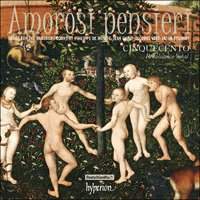Texte paru dans: / Appeared in:
*

International Record Review - (07-08//2014)
Pour
s'abonner / Subscription information
Hyperion
CDA68053

Code-barres / Barcode : 0034571280530
(Classicalacarte ID419)
Cinquecento has not hitherto been noted for hitherto been noted for its interest in secular music, but this stunning disc immediately makes one want to hear it in more of this repertoire. And what repertoire it is: extremely good, almost completely unknown music by four composers who are hardly household names, but who all worked at the Imperial Chapel in Vienna. I cannot, in fact, recall ever before hearing any secular music by Vaet ‑ his sacred music is a rare enough commodity ‑ and Jean Guyot is completely new to me.
Secular music, of course, implies a command of vernacular language or, in this case, languages, and Cinquecento's members are as excellent in this respect as they are at phrasing and tuning. The songs here are settings of texts in Italian, German and French, all three of which sound thoroughly idiomatic.
Perhaps
the most interesting discovery here is Guyot, who it appears survived for
under one year at the Imperial Chapel, the new emperor, Maximilian II,
preferring Vaet for the position. Guyot's songs are certainly
reminiscent in their flowing textures of composers such as Gombert and
Crecquillon, but they have a distinctive melodic quality which I find quite
striking.
The six‑voice
Vous perdez temps de me dire mal d'elle illustrates this intriguing
combination particularly well.
Vaet's only
thee songs are also quite loveIy, much less complex texturally than those by
Guyot, The more Italian‑orientated Regnart provides some lighter
refreshment, even in the four German‑texted songs included here, and de
Monte's madrigalian perspective on earlier chanson style is
characterized by his outstanding competence and elegance ‑ O dolci
sguardi is probably the most superb example of this. Can we have a
second volume?
Fermer la fenêtre/Close window
Cliquez l'un ou l'autre
bouton pour découvrir bien d'autres critiques de CD
Click either button for many other reviews


